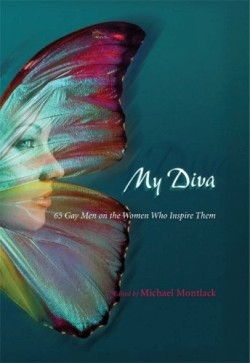My Diva
65 Gay Men on the Women Who Inspire Them
Some of the credit for Michael Montlacks lively, engaging collection has to go to Stevie Nicks-even though she and the editor havent met, and its possible that shell never read his ode to her power.
Thats beside the point, however. For nearly all of the essayists in My Diva-the ruminations on the charms, confidence, and beauty of the women who influenced them-arent for the women themselves. Rather, theyre a bright glimpse into the nature of diva-worship and how such ideals can shape lives. Some even choose fictional divas-Princess Leia, Wonder Woman, Endora from Bewitched-further displaying how sometimes just the portrayal of glamour and strength can be transformative.
The book project was kicked off when Montlack, a poet and English professor at Berkeley College, decided to write an essay on Stevie Nicks, his teenage-era heroine. While pondering the connections between gay men and their divas, he solicited submissions, and encountered a landslide of enthusiasm. His only rules: one diva per writer, and no repetition, to prevent multiple essays on Cher, for example.
The result is a wide-ranging, intelligent romp through history, arranged according to diva birth date. The journey begins with Sappho, and covers mainly musicians, writers, and actresses. The perhaps predictable choices of Judy Garland, Barbra Streisand, and Madonna dont even appear, much to Montlacks admitted surprise. Their omission makes way instead for women like Lucille Ball, Julia Child, Nina Simone, and Margaret Cho.
The essayists, too, encompass a wide swath of experience, from poets and professors to novelists and activists. Although their essays each have a distinctive voice, they share a common tone of awe toward the women they honor. The writers often marvel at the nuanced empowerment they felt simply by watching a divas movies, or listening to her songs, sensing qualities that they could fold into their own lives.
In writing about Gloria Swanson, for example, novelist and poet Edward Field notes: “There is something about these larger-than-life movie stars that represents our yearnings for vindication, in which we see ourselves transcending the difficulties a gay man faces in this world.” Even though Swanson spirals into delusion in Sunset Boulevard, she goes down in glory, acting out the struggles and ambition mirrored in the life of a gay man, Field believes.
The essays in this collection are brief but luminous, and relevant to all of us. They show the brighter side of a celebrity culture-one in which icons arent tabloid fodder, but instead, act as forces of change and personal power for those who love them from afar.
Reviewed by
Elizabeth Millard
Disclosure: This article is not an endorsement, but a review. The publisher of this book provided free copies of the book to have their book reviewed by a professional reviewer. No fee was paid by the publisher for this review. Foreword Reviews only recommends books that we love. Foreword Magazine, Inc. is disclosing this in accordance with the Federal Trade Commission’s 16 CFR, Part 255.

